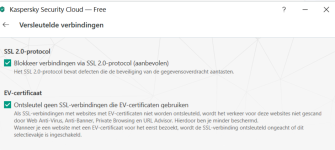D
Deleted Member 3a5v73x
HTTPS scanning is cruical feature? I have more chanse to get infected if my security product doesn't scan HTTPS traffic?The problem is for Google to fix, which has fixed and broken over multiple updates.
HTTPS is essential for Kaspersky Web Protection, especially nowadays where most websites already migrated to HTTPS. Any malware links in HTTPS won't be blocked by Kaspersky otherwise, which is a huge security risk.
